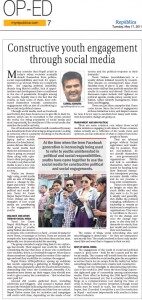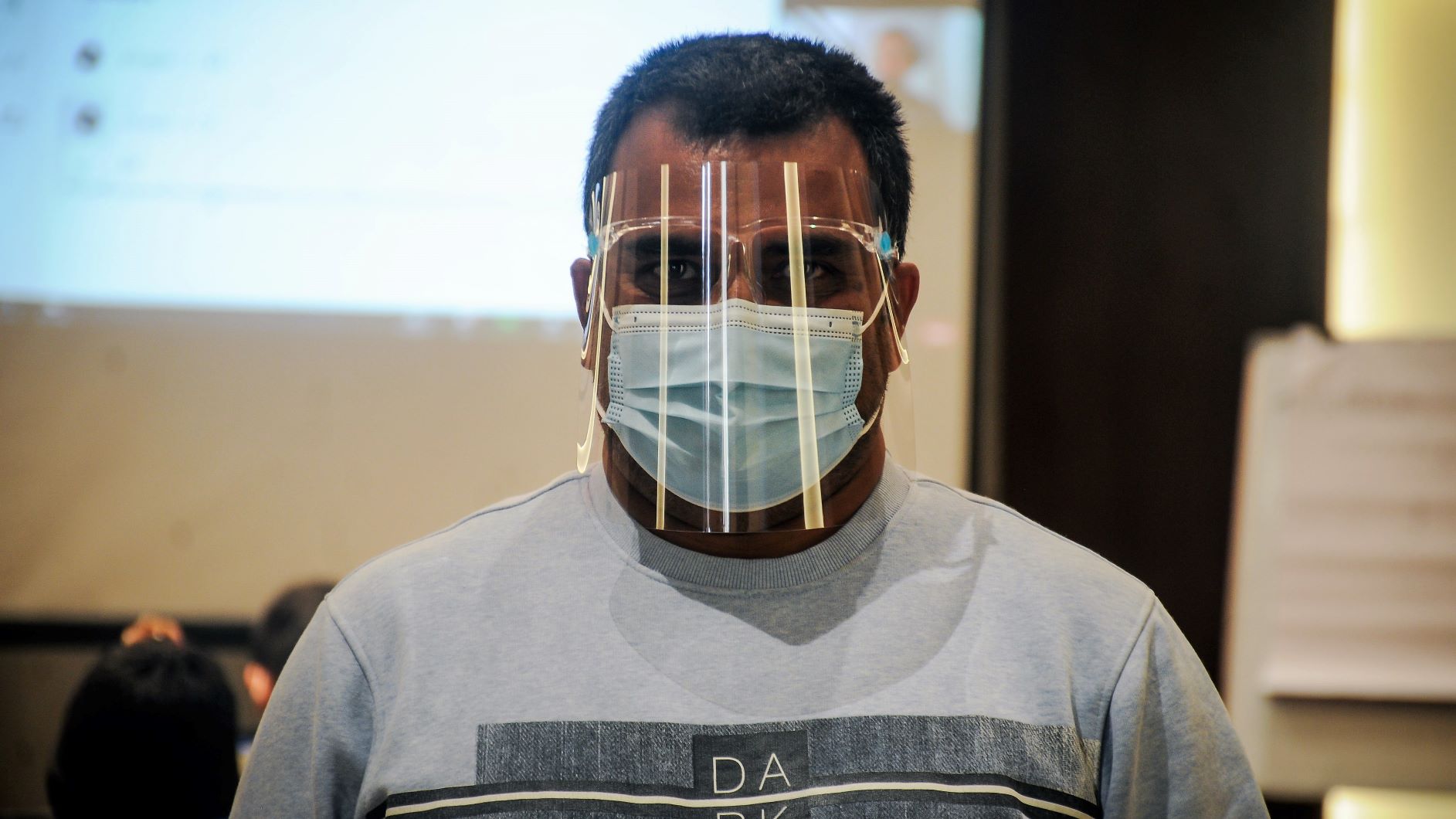At the time when the term Facebook generation is increasingly being used to refer to youths uninterested in political and social responsibilities, youths have came together to use the social media for constructive political and social engagements.
 Many consider that Nepali youth in today’s urban societies normally detach themselves from politics, social responsibilities and look for opportunities to go abroad. While not completely false the ongoing political instability, decade long Maoist conflict, lack of opportunities and development have contributed to the rise of pessimistic thoughts among the youths. Equally true is the fact that the youths, at least some of them, have refocused themselves towards constructive engagements with an aim of contributing to the social and political causes.
Many consider that Nepali youth in today’s urban societies normally detach themselves from politics, social responsibilities and look for opportunities to go abroad. While not completely false the ongoing political instability, decade long Maoist conflict, lack of opportunities and development have contributed to the rise of pessimistic thoughts among the youths. Equally true is the fact that the youths, at least some of them, have refocused themselves towards constructive engagements with an aim of contributing to the social and political causes.
Through social media, such as Facebook and Twitter, they have found a tool to give life to their initiatives; which can be accredited to the events around the world, the rising popularity of social media and most importantly, the trendiness of the social media that matches the youth’s curiosity.
Use of Facebook and Twitter is still considered by many as a detachment from what is happening around. Looking at someone, who is constantly checking on Facebook and Twitter updates on their laptop and/or mobile phones, the detachment, seems obvious. But when the social media feed them the information on what is going on around them along with opinions to their peer groups, it is safe to say that social media is just a new way of communication of the society.
Youths are increasingly using social media with an aim of bringing about a change by dialogue and action – within themselves and in the political and social system. Tweet for Cause Nepal, Nepal Unites and Tweet Debate are three examples of how social media are contributing to the engagement of youths.
DIALOGUE AND ACTION THROUGH SOCIAL MEDIA
Tweet for Cause Nepal (@tfcNepal) is a small group of youths using Twitter, also known as tweeple, who contribute to a fund – at least 20 paisa for every Tweet, or message on Twitter. There are around 200 tweeple who have signed up but when they met last time, physically, two dozens attended the meeting.
The group extended a supporting hand to an orphanage last month. Their support was worth Rs. 14,000 but considering the fact that most of those who contributed were students, this is a considerable support. More than a dozen members of group heard the stories of the orphanage and said they would like to continue the support.
Nepal Unites (@NepalUnites) sprang up suddenly last month organizing a gathering at Maitighar Mandala, that was popularly called the Facebook Revolution, demanding that since the Constituent Assembly (CA) members have drawn up their wages, they should now work to give country the constitution – ‘that is what they were paid for.’
Around 200 youths gathered there, including celebrities and bloggers, and created a human chain around the Mandala indicating that the youths have not escaped from political agenda and that they are united. Nepal Unites states that its ‘activities and campaigns will evolve with time, depending on the needs of our society and the political response to their demands.’
Tweet Debate (tweetdebate.net) is a weekly debate initiated recently by tweeple. They discuss on contemporary issue every Saturday from 10 pm to 12 pm – the timing may seem odd but that perfectly matches the youths in country and abroad. Their recent discussion topics include civil vigilance on political agenda, media piracy, sneaky journalism, online identify management, brain drain and blogging.
These are just three examples that I have come across. Since the level of engagement in those initiatives is low, and impact unseen for now, it is not easy to ascertain how many such initiatives for positive change are going on.
TRANSPARENT AND NON-POLITICAL
There are some common core values those social media initiatives engaging youth shares. Those common values actually are a reflection of the youth views and opinions, and an indication of what to expect from those people in future.
They are informal groups without formal registration and leadership by position. They are non-political; do not classify themselves as non-governmental organizations (NGOs) and look to contribute themselves rather than search for funding; keep their financial transaction transparent posting accounts details online and do not promise a long-term commitment.
Those core ideas give an insight on what the youth dislike and what they want to do. To put it simply and generally, they dislike the political wrangling, selfishness of leadership to remain as leaders and corruption in organizations. They want to contribute to the society for the change and once the change happens, or else they feel it demands too much, they just vanish and continue their own business.
The nature of blogs, social networking sites and microblogging is democratic – for they are transparent and mostly free. The youth involved in those truly understand this and want that to happen in their society.
BEST OF SOCIAL MEDIA
The engagement of the youth in social and political causes is good news – both for the country and for the social media. The country will benefit from the activities and initiatives while the social media gains the recognition as service that is not an escape from the reality but rather something that could be more creative and constructive.
Blogs took the limelight in disseminating information to the world in 2005 when the then King Gyanendra tightened grip of censorship among mainstream media. Their effect in fueling the 2006 April Uprising has not been assessed yet, but it certainly established blogs as a communication tool during the time of crisis in Nepal. The current initiatives through social media may be small in scale, but they have raised hopes, that if needed it would be a tool for revolution in Nepal – and most importantly with youths in helm of the revolution.
(As published in Republica)

